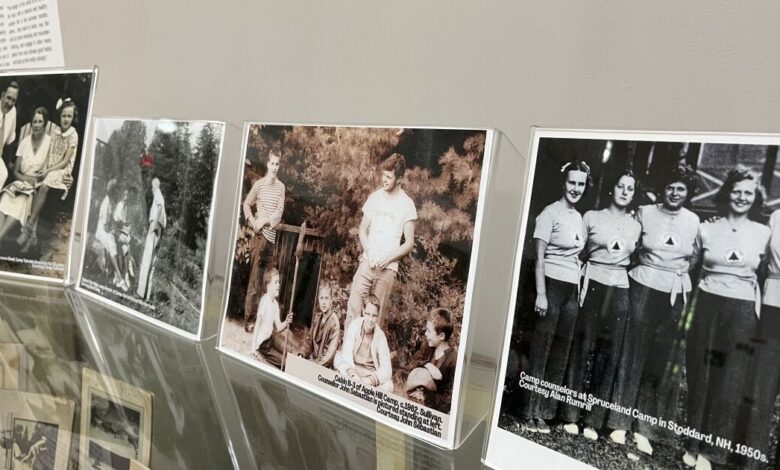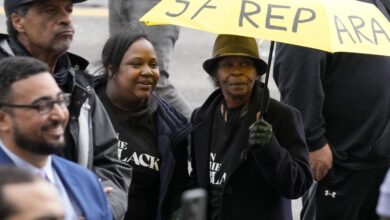In Keene, an exhibit explores the complicated history of New Hampshire summer camps

Kids have been going to summer camp in New Hampshire for well over a century. A new exhibit at the Historical Society of Cheshire County in Keene explores that history, tracing the evolution of summer camps and the social context that shaped them.
New Hampshire was home to some of the country’s earliest summer camps, and was also the first state to license and regulate them, according to Jenna Carroll, the historical society’s director of education.
“The social history tied to the summer camp experiences is absolutely fascinating,” she said. “There’s so much to be said about child-rearing practices and how people spend their vacation and how that’s evolved over time.”
Cheshire County’s first summer camp, Camp Harvard, began in Rindge in 1885 before moving to Squam Lake. Summer camps, resorts and other country getaways grew in popularity as the country became more urbanized. Carroll said well-off parents from places like New York City would send their kids north to experience the outdoors.
The idea of what a camp could be evolved over time, with some focused on preparing for school or specific skills, like music and horseback riding. The region’s first girls’ camps formed in the early 20th century, and the first coed ones somewhat later.
The exhibit features photos and memorabilia from dozens of camps in Cheshire County going back decades — brochures, ribbons and patches, antique sporting equipment and personal items that campers would pack. An audiovisual presentation includes interviews with former campers and recordings of old camp songs.
“There was a lot of history, and it was difficult to put it all in there,” said Alan Rumrill, the historical society’s director. “But we’ve tried to touch on about 86 camps that we found in the region.”
Those camps are also a window into the social history of their eras. Some early camps catered to anxieties about city life and its impact on boys’ masculinity, equating time in the outdoors with manliness. Female camp directors began pushing for girls’ camps starting in the early 1900s, offering outdoor activities alongside chores and crafts meant to prepare them for domestic life.
“You see a lot with gender issues,” Carroll said, “and what are we going to do about the fast pace in society and how society is changing? What impact is that having on our young boys and our young girls?”
The exhibit also explores the role of race — and racist traditions — in early 20th century summer camps. According to the historical society’s research, it was common for local camps to hold minstrel shows, with performers in blackface. The exhibit includes a photo from one such show at a camp in Chesterfield during the 1920s. It was also common for camps to appropriate Indigenous culture, a practice that has persisted to the present day.
But some New Hampshire camps challenged those trends. In the 1940s, the Rev. James Robinson, a Black Presbyterian minister, opened a pair of racially integrated summer camps in Winchester.
Charles Eastman, a renowned Dakota Sioux physician and author, established Camp Oahe — a summer camp for girls — in Stoddard with his wife Elaine in 1916.
“The Eastmans’ camp was more specific to Dakota teaching and culture,” said Kiara Vigil, a professor at Amherst who’s studied Eastman. She contrasted that with other camps of the time that were adopting a sort of generalized, composite “Indian-ness aesthetic.”
For Eastman, bringing that heritage to largely white, middle class campers represented “a future in which Native people are a real part of modern America as a nation,” Vigil said. “And this would be really different from the kind of ‘Indian play’ where it’s more an imperialist nostalgia.”
Vigil will give a talk about Eastman, Camp Oahe and the “playing Indian” phenomenon within the context of summer camps on Wednesday evening at the Historical Society of Cheshire County. The exhibit is open through Sept. 2.























































